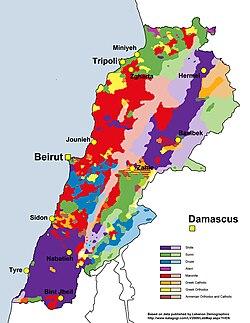The UK government has issued updated travel advice for Lebanon, highlighting key safety considerations and practical information for British travelers. As Lebanon continues to navigate political and economic challenges, potential visitors are urged to stay informed about the latest developments to ensure a secure and smooth trip. This article summarizes the essential guidance provided by GOV.UK, offering insights into security risks, local conditions, and recommended precautions for those planning to visit the country.
Travel Safety and Security Considerations for Visitors to Lebanon
Visitors to Lebanon should exercise heightened vigilance due to the complex security landscape in the region. It is strongly advised to remain informed about local developments by following updates from official sources and reputable news outlets. Avoid demonstrations and large gatherings, as these can escalate unpredictably. Travelers should also be cautious when moving around at night and refrain from visiting areas close to the Syrian and Israeli borders, where security incidents have been more frequent. Carry valid identification at all times and register with your embassy upon arrival to facilitate assistance if needed.
Key safety measures for travelers include:
- Consulting travel advisories before and during your trip
- Keeping emergency contact details readily available
- Using licensed and trusted transportation services only
- Securing personal belongings to prevent petty crimes
- Respecting local customs and laws to avoid misunderstandings
| Risk Factor | Recommended Precaution |
|---|---|
| UNIQUE IDENTIFICATION CHECKPOINTS | Carry official ID and comply with security checks promptly |
| ROAD CONDITIONS | Exercise caution on rural roads; avoid night driving |
| POLITICAL UNREST | Stay away from protests; monitor local news |
Navigating Local Customs and Cultural Etiquette in Lebanon
Visitors to Lebanon should be mindful of the country’s rich cultural tapestry, where tradition and modernity intertwine. Public displays of affection are generally frowned upon, especially in rural areas, so it is advisable to exercise discretion. When greeting locals, a warm handshake is common, though it’s respectful to wait for a woman to offer her hand first. Dress codes tend to be conservative, particularly in religious sites; modest clothing that covers shoulders and knees is expected. Avoid discussing sensitive topics such as politics or sectarian issues in casual conversation to maintain a respectful atmosphere.
Understanding local hospitality customs can greatly enhance your experience. Lebanese people are known for their generosity and may invite you to share a meal or tea. Accepting such invitations graciously is a sign of respect. When dining, it’s customary to wait for the host to signal the start of the meal, and leaving food on your plate can be seen as impolite, as it may imply dissatisfaction. Use your right hand when eating or giving and receiving items-it is considered more respectful. Below is a quick guide to key etiquette points to remember:
| Custom | Etiquette Tip |
|---|---|
| Greeting | Wait for a woman to extend her hand first |
| Dress Code | Cover shoulders and knees in religious or rural areas |
| Dining | Wait for host to start, avoid leaving food uneaten |
| Communication | Avoid political and sectarian topics |
| Hand Usage | Use right hand for eating and handshakes |
Health Precautions and Medical Facilities Available for Tourists
Travelers to Lebanon should prioritise certain health measures to ensure a safe and comfortable visit. Vaccinations for routine diseases such as measles, mumps, rubella (MMR), and diphtheria-tetanus-poliomyelitis are recommended. Additionally, Hepatitis A and Typhoid vaccines are advisable, especially for visitors planning to eat street food or stay in rural areas. Drinking only bottled or purified water and practising good food hygiene are essential preventative steps to avoid common gastrointestinal illnesses. It is also wise to carry a basic first aid kit, including medications for altitude sickness if venturing into mountainous regions.
The Lebanese healthcare system offers several private and public medical facilities that cater to tourists, primarily concentrated in Beirut and major cities. Private hospitals provide modern equipment and English-speaking staff, while government hospitals have more limited resources but are available in emergencies. Travel insurance with medical coverage is strongly recommended, as treatment costs in private facilities can be high. Below is a brief overview of key medical facilities frequented by tourists:
| Facility | Location | Service Highlights |
|---|---|---|
| American University of Beirut Medical Center | Beirut | Advanced emergency care, multilingual staff |
| Hotel Dieu de France Hospital | Beirut | Modern diagnostics, international standards |
| Rafik Hariri University Hospital | Beirut | Public hospital, available for emergencies |
| Mount Lebanon Hospital | Beirut | Specialised in critical care and surgery |
The Way Forward
Travelers considering a visit to Lebanon are advised to stay informed through official channels such as GOV.UK, which provides up-to-date guidance on safety, health, and entry requirements. Given the evolving situation in the region, vigilance and thorough preparation remain essential. For the latest travel advice and detailed information, prospective visitors should regularly consult government sources before planning their trip.




